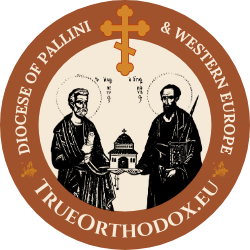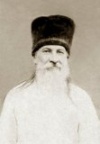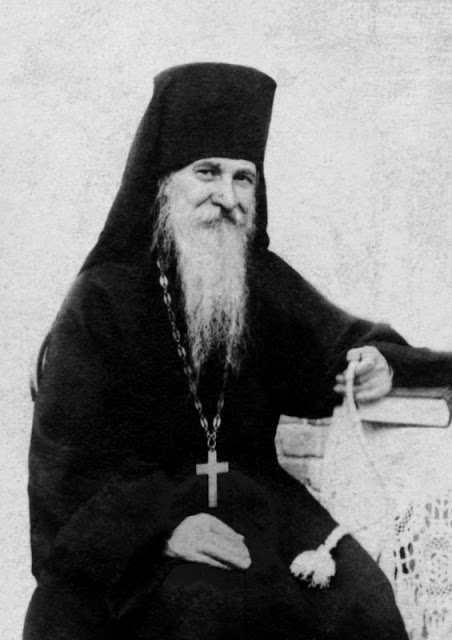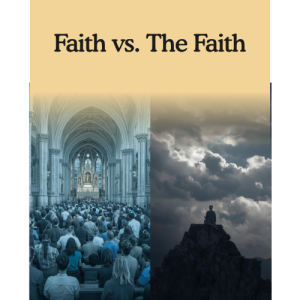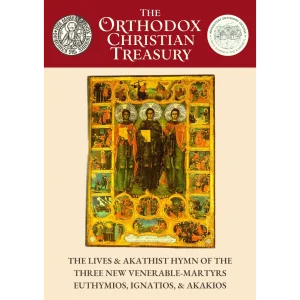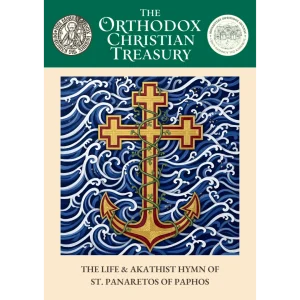St. Joseph of Optina – May 9

Our venerable father Joseph (Litovkin) of Optina was starets and hieroschemamonk among the group of monastics of Optina Monastery in the nineteenth century who were known as the Optina Elders. Elder Joseph is venerated on May 9 and with the Synaxis of the Optina Elders on October 11.
The Elder Joseph was baptized John after he was born on November 2, 1837, into a family with pious and simple parents, Euthymius and Maria Litovkin, in the village of Gorodishcha in the Kharkov province. Taught by his older sister, Alexandra, he learned to read before he began school. Although a sickly child, Joseph was happy and affectionate and led a God-centered life. While a young child he suddenly became transfixed while playing, lifted his head and hands to the sky, and then collapsed. Later, he said he had seen the Queen of Heaven in the air.
Both his parents had died by the time he was eleven years old. Orphaned, John was moved from one home to another, often suffering from hunger, enduring cold, and sometimes beatings until a merchant took a liking to him and his quiet ways. Although the merchant offered to take him into his family, the merchant realized that John had committed himself to the Lord and released him to go on a pilgrimage.
Setting off for Kiev, John stopped at the Ss. Boris and Gleb Hermitage to see his sister, now Mother Leonida. Overhearing their conversation, Leonida’s Eldress, the schema-nun Alypia interrupted them and advised John to go to the elders of Optina instead of Kiev. On March 1, 1861, at Optina, John related his story to Elder Ambrose who advised him to stay at Optina, to which John replied “May it be blessed”.
As a novice John began his obedience in the kitchen. From the start, John demonstrated his obedience and humility as he entered into a life that was everything he had hoped it would be. In June 1861, John was asked by the Superior of the skete, Fr. Paphnutius, to become the cell-attendant of the Elder Ambrose a position that he would retain for the next fifty years. Even as happy as he was John still contemplated would he be better off elsewhere – Kiev, even Mount Athos. But, the understanding Elder Ambrose, realizing John’s thoughts, urged him to stay at Optina.
On April 15, 1872, John was tonsured as a rassophore, followed on June 16, 1872, with his tonsure as a monk. He was given the name Joseph, honoring St. Joseph the Hymnographer. On December 9, 1872, Fr. Joseph was ordained a deacon by Bishop Gregory of Kaluga after Joseph was unexpectedly nominated by Igumen Isaac, when on December 7 he and Fr. Ambrose could not agree on the ordination of two other candidates.
On October 1, 1884, Fr. Joseph was ordained a priest. That day, Bishop Vladimir of Kaluga conducted the ordination at the liturgy celebrating the opening of the Convent of Shamordino, eight miles from Optina, that was built by Fr. Ambrose. From that day, the nuns of Shamordino regarded Fr. Joseph as their priest, and, after the repose of Fr. Ambrose, he became the spiritual director of the convent.
While Fr. Joseph continued as Fr. Ambrose’s cell-attendant, he found time to read spiritual books, especially the Philokalia and the writings of the fathers, finding in them spiritual wisdom that he shared with those who came to him for advice. Foreseeing that Fr. Joseph would serve as Elder after him, Fr. Ambrose blessed some people to start going to Fr. Joseph for their spiritual needs.
After Fr. Ambrose reposed on October 10, 1891, Fr. Joseph succeeded him, having been prepared by Fr. Ambrose who taught him by word and by example. In February 1886, Fr. Joseph, whose health was not always good, became very ill. Moved to the infirmary, Fr. Joseph was tonsured to the schema on February 14. The following day as prayers for the Departure of the Soul were read to him, a novice heard someone behind the screen around Fr. Joseph say, “Be patient, my dear one, only a little remains.” The novice looked behind the screen, but saw no one except Fr. Joseph. Later, Fr. Ambrose related that Fr. Joseph had seen the Mother of God during his illness. Though he had been quite near death, Fr. Joseph got well.
In June 1890, Fr. Joseph began to prepare for the annual journey to spend three weeks at Shamordino Convent with Fr. Ambrose. Instead Fr. Ambrose told him, “I’m not taking you this time, you’re needed here.” He then ordered Fr. Joseph to move into his cell and to transfer a large “Surety of Sinners” icon into the reception room. Fr. Joseph had a premonition that Fr. Ambrose would never return.
Resigned to the situation, Fr. Joseph visited Fr. Ambrose monthly. With Fr. Ambrose absent, many monks who confessed to him began to go to Fr. Joseph. During the Nativity Fast, Fr. Ambrose started sending his spiritual children at Shamordino to confess to Fr. Joseph as well. This was difficult for the nuns, who were used to Fr. Ambrose. Even when he heard a nun’s confession himself, Fr. Ambrose would send her to Fr. Joseph for the prayers of absolution. In this manner, he indicated that he was entrusting his spiritual children to no one but Fr. Joseph.
In September 1891, Fr. Ambrose became ill, but no one thought it was serious. On October 8, his condition was so critical that they sent for Fr. Joseph. That evening the service of Holy Unction was performed, and the next morning Fr. Joseph gave Fr. Ambrose Communion for the last time. Fr. Ambrose reposed on the morning of October 10. Even in his sorrow Fr. Joseph comforted and consoled others.
After the repose of Fr. Ambrose, the monks of Optina began coming to Fr. Joseph just as they had come to Fr Ambrose. Fr. Joseph was appointed officially as confessor for the Optina brotherhood near the end of 1893 when Fr. Anatole became ill and could not fulfill this duty. When the nuns of Shamordino asked to whom they should go for spiritual direction, Fr. Isaac told them, “At Optina all we have is Fr. Joseph as our common Elder, and he must be yours as well.” For the next twenty years, Fr. Joseph received visitors, gave spiritual counsel to those who asked for his advice, and even performed miracles of healing for the afflicted.
Fr. Anatole, who headed the skete, fell asleep in the Lord on January 25, 1894. With his repose, Archimandrite Isaac and the brethren chose Fr. Joseph to succeed Fr. Anatole as Superior of the skete.
During the last years of his life, Fr. Joseph grew weaker and was often ill. In May 1905, he felt that he lacked the strength to carry out his duties, and asked to retire as Superior of the skete. He also had to give up hearing the confessions of visitors, since this exhausted him. As 1911 began, Fr. Joseph felt weak and ill, but during Great Lent he began to feel somewhat better. During Holy Week, he was unusually joyful, which led some to believe that he had had some sort of vision. On April 11, the third day of Pascha, Fr. Joseph developed a fever. The following week, a doctor diagnosed him with malaria, declaring that there was no hope for recovery.
From April 28 on, Fr. Joseph stopped taking food. He nourished himself only with the Holy Mysteries of Christ. Up until the time of his death, he was conscious and lucid. He answered questions and dictated replies to letters. On May 8, he felt better, but then again became weak. On the morning of May 9 he received Holy Communion. That evening, May 9, 1911, Fr. Joseph departed to the Lord with a smile on his face.
